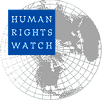| Source: http://www.hrw.org/campaigns/kosovo98/index.htm Accessed 08 May 1999
KOSOVO HUMAN RIGHTS FLASH #35
(New York, May 8, 1999) — Ethnic Albanians who remain in Kosovo face hunger, overcrowding, and lack of medical attention, in addition to the fear of being killed or expelled from their homes. Human Rights Watch researchers based in northern Albania and in Macedonia have received dramatic reports from refugees that food supplies are dwindling; certain villages are packed beyond habitable levels; and medical care is generally unobtainable. In addition, some ethnic Albanian men have been reportedly forced to dig trenches for the Yugoslav Army along the border. Large numbers of men in Kosovo, fearing abuse at the hands of Serb forces, fled their villages and escaped to the mountains. Some of these men who have since become refugees in Macedonia and Albania described the severe conditions of such mountain retreats, where food, shelter and basic provisions are lacking, and cold temperatures create added hardship. "We went five days with nothing to eat, freezing in the rain," related Ahmed Hazeri, twenty-three years of age. "Finally we had to come down to [the village of] Nagafc, where we had heard it was free of Serb forces." Certain villages, usually the more remote ones, have functioned as ad hoc refuges for large numbers of people displaced from their home villages. Conditions in those villages are ghastly. In early April, Nagafc, in southern Kosovo, reportedly held the inhabitants of seven neighboring villages. These villagers had converged on Nagafc to escape the Serb forces that had taken over their homes. According to refugees, each Nagafc household held some 75 to 150 additional occupants. Upper Gadimia, a village south of Pristina, was another such refuge; by mid-April it reportedly held tens of thousands of displaced people from the villages of Cernillä, Babushi, Tėrna, Bablok, Mirash, Kishna-Pola, Vrella, Plitkoviq, Zhegavc, Markofc, Bunullė, Gllavicė, and Smallushė. Conditions in such overwhelmed villages are dire: food is lacking, sanitation is nearly non-existent, and severe overcrowding encourages the spread of disease. The potential food crisis is of particular concern. Ethnic Albanians' emergency food supplies have in many instances been depleted, shops are closed, and it is often unsafe to forage outdoors for food. In towns and villages where Serbs live, refugees have reported to Human Rights Watch that Serb merchants have refused to sell food to ethnic Albanians, and that Serb police have barred them from entering stores. Many recently arrived refugees have also described having spent days traveling with little or nothing to eat and drink. Most seriously, ethnic Albanians who have been forced to flee their homes without mechanical means of transportation are in particular danger of falling victim to exhaustion. People arriving in Albania by car and tractor have reported seeing others stumbling down the roads barefoot and even collapsing at the side of the road. A lack of access to medical care has also had a severe impact on Kosovar Albanians. A family from Mitrovicė, for example, described to Human Rights Watch the death of its seventy-eight-year-old patriarch, Muhamet Ēitaku. While being expelled from his home by Serb security forces, Ēitaku suffered a heart attack, but because the family had to flee in panic it was unable to secure him any medical attention. Later, during the family's exhausting four-day drive to Albania, he died in the car near Gjakovė. Although the car was crowded, the family was forced to continue driving for about ten minutes after he died, until it was safe for them to stop and hurriedly dig him a shallow grave. Several refugees described how relatives and friends hit by Serb bullets or mortar fire received no medical care for their injuries, some dying many hours after being attacked. A teacher from Hade village, Milaim Mirena, was reportedly shot by Serb security forces in front of his home on April 29 as he attempted to surrender. His family carried him when they fled the house, but were unable to convince the Serb police to allow them access to a doctor. Mirena died of his wounds some five hours later. Refugees who have fled Kosovo during the past week also report that Serbian forces have detained ethnic Albanian men and forced them to dig trenches. Six refugees from the city of Prizren who were interviewed by Human Rights Watch in northern Albania reported that they had seen groups of ethnic Albanian men being forced to work along the road between Prizren and the border village of Vrbnica (Verbnicė in Albanian). Each of the refugees, interviewed separately, reported that they had seen small groups of ethnic Albanian men being forced to dig trenches while being guarded at gunpoint by Serbian police or Yugoslav Army soldiers. Each of the refugees stressed that trenches were being dug primarily in the area between Vrbnica and the nearby village of Zur (Zhur), near the Albanian border. Some of the Albanian detainees were wearing grey work suits, the witnesses said. But others were wearing green jackets of the Yugoslav Army, which could make them the object of NATO attack. According to recent NATO estimates, there are currently some 820,000 internally displaced persons inside Kosovo. Human Rights Watch is deeply concerned about the serious deprivations and life-threatening hardships faced by this population. For further information contact: **** |

 Document compiled by Dr S D Stein
Document compiled by Dr S D Stein